Snapshots of UC Berkeley students in a time of war
Every few days, NewsCenter staff approach students at random, in different locations around campus, and ask them to share their thoughts and emotions about the tumultuous events taking place in the world. Every student willing to respond is quoted and included on this page with only minimal editing. Yet since this series began, the NewsCenter has received several e-mails complaining of bias in the responses: one says the students selected are too pro-war, while another alleges that they are unpatriotic and unsupportive of U.S. troops. The lesson? UC Berkeley students are as diverse in their opinions as the general population: we can't predict what they will say, and we shouldn't presume that we can. Comment
How does war
with Iraq affect you personally?
April 10, 2003:
| 'I
have mixed emotions about the war. I'm really critical
of the media. The media has a big effect on what we perceive — we
can't trust what's being given to us. Yesterday we saw
all these images of the U.S. "liberating" Baghdad,
putting the U.S. flag on that statue of Saddam Hussein,
but then the Iraqis were like, No, take that down, and
the soldiers put up
the Iraqi flag instead. Were they cheering because U.S.
soldiers are there or because the regime is over? I don't
know. I guess yesterday was a turning point in the war,
but who can be sure. I'm in a state of
confusion. One minute we were after Osama Bin Laden; the
next, Saddam Hussein. There was no transition.' —Mina Sisouvong, third-year double major
in art history and mass communications, outside Doe Library.
Hometown: San Diego, CA
|
 |
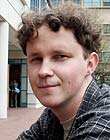 |
'Obviously
here we're pretty detached from it all. It doesn't
affect me personally, except that I don't feel that
violence is ever a legitimate means to an end. We see
pictures of Baghdad citizens dancing in the streets,
but we have to take into account the media bias. Is
it possible to impose democracy? I think it's great
that Saddam Hussein is gone, but I worry what our commitment
is going to be in Iraq. Despite all our promises, we
pulled out of Afghanistan so quickly. Now the country
is being run by warlords. I wonder if we are really
committed to the rhetoric of rebuilding as Bush is
saying, or whether we just have more mercenary motives
like oil.' —Erik Kemp, fourth-year political
science major, outside Pat Brown's Grille.
Hometown:
Fairfield, CA |
| 'Well,
student fees have gone up, which affects me — Bush
is putting all the money into the war instead of
investing in education. The economy was already bad
and now it's going to get worse. I hear fees are
going up $400 next semester. I really don't like
what's going on. I don't agree with this war in
the first place.' —Jasmine Mora, first-year
political science and Spanish major, at Lower Sproul
Plaza. Hometown: Los Angeles
|
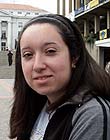 |
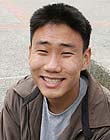 | 'It
affects the atmosphere on campus — it's not as
jovial as it was before the war started. There's this
air that war should be stopped, and if you don't agree,
then there's also this pressure to support the war.
Even after 9/11, I didn't personally feel so many effects,
but ever since then it has been harder to concentrate
and to motivate myself. It kind of stays in the back
of your head.' —John Lee, fourth-year major
in electrical engineering & computer science, at
Lower Sproul Plaza. Hometown: Culver City, CA |
| 'Personally
it hasn't affected me much, other than I have been
worried about what the future is going to be like.
Maybe that's because I'm an integrative biology major,
and we're too concentrated on our science classes
and getting ready for midterms. We might as well
not even know the war was happening.' —Jaya Jacobs, third-year
integrative biology major, outside Moffitt Library.
Hometown: Monterey, CA
|
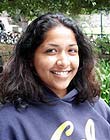 |
April 1, 2003:
| 'I feel for the most part the public is uninformed about the
war. It's hard to know who to trust — whether
the media is portraying the war accurately. Nobody except
those few people
on the inside have the real story about what's going on.
As an American citizen, I'm putting my trust in the President
and I feel comfortable with that. Regardless of whether
we agree with the war, we should be supporting and praying
for our President
rather than bashing him. I'm sure war isn't something
he asked or hoped for, but as our country's leader he has
to take care of this. We should support him.
I also feel saddened at the amount of deaths, even though so
far it's small compared to other wars. I don't like war,
but I don't like dictatorships either.' —Evan Rosa, second-year undeclared major,
at Upper Sproul Plaza. Hometown: San Diego, CA
|
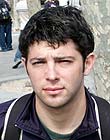 |
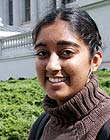 |
'It scares me. The first community to
experience a backlash when we invaded Afghanistan was
the Sikh community, of which I am a member. There's
already been hate crimes reported, and I wish the campus
would address this. I also worry about the repercussions
of the war on foreign policy and our relations with
the rest of the world.' —Camille Pannu, first-year
undeclared major (Political Economy of Industrial
Societies intended), near Doe Library. Hometown:
Moraga, CA.
|
| 'It's
a big deal. It involves everyone. I've been deeply
affected by knowing our troops are over there in danger,
and that innocent people are dying. But I think what
we're doing is the right thing — we need
to go in there and get rid of Saddam Hussein. In the
end, even though we're worried about friends
and family, this is something we need to do.' —James Gallagher, fourth-year
political science major, at Upper Sproul Plaza. Hometown:
East Nicolaus, CA.
|
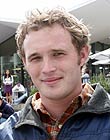 |
 |
'I
don't know anyone over there or going over there,
but I think it is affecting everyone. It's such
a change of foreign policy in the world, the U.S. being
the aggressor. I’m taking a Peace and Conflict
Studies class right now and we’re just talking
about past wars and how easy it is to see this as a
trend — the U.S. going off somewhere to free
people from oppression. It's
a powerful idea, and a lot of people buy into it. At
the same time, it's hard for me to say that we're
the right people to do that. The war also affects me
in how I think about how it affects the world community — us
going over the head of the United Nations, undermining
the world community. I hope we can turn that around
after the war and not be this unilateral power.' —Matt Detar, fourth-year rhetoric
major, on Lower Sproul Plaza. Hometown: Corvallis, OR. |
March 26, 2003:
| 'I have two small children, so I have to explain to my five-year-old what's going on in the world in little-people terms. It's hard. The war is depressing, it makes it hard to study and hard to concentrate. School just seems insignificant. It all makes me want to go home - like whenever something bad happens, you want to call your mother so you can feel safe.' —Dina Hunt, fourth-year civil engineering
major, in the Bechtel Engineering Center.
Hometown: New Orleans, LA.
|
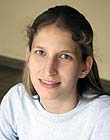 |
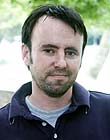 |
'It's disappointing to me, how we are looking
to the world, how they are seeing the U.S. Here at Berkeley,
you hear the other side. I think it's a stupid, silly war.
It would have been nice to have U.N. approval, to do something
diplomatically for a change. One thing is, I'll never vote
the Green Party again: this has definitely taught me to
choose the lesser of two evils.' —Andy Amacher, Ph.D. candidate
in environmental science, policy and management, outside
Mulford Hall. Hometown: Sunnyvale, CA. |
| 'Although it doesn't affect me personally, it's around me, it's part of my reality. It's kind of overwhelming because we can't stop the war. I'm anti-war. I actually made a shirt that says "Peace" on the sleeve and on the back it says, "Whatever war can do, peace can do better." My roommate likes it, but my mom says that if I wear it out I might get attacked.' —Chung-Hay Luk, second-year bioengineering major, in the Naval Architecture Building. Hometown: Lafayette, CA.
|
 |
March 24, 2003:
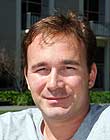 |
'It only affects me in a general way, having
concerns for my fellow Americans and their safety.
As for being fearful personally, no, I'm just a tad apprehensive.
I'm behind what we're doing in Iraq. I think it's right.
I just hope
there aren't inordinate numbers of casualties on our side.' —Craig Attencio, bioengineering
Ph.D. candidate, outside Wurster Hall. Hometown: Sacramento,
CA
|
| 'The war affects me largely through my boyfriend, who
is Israeli. He worries about his friends and family at home more than
anything. For me, it's a big issue. I debate and talk to other people
a lot about it. I wasn't sure if I would come to Berkeley this time,
whether it was safe to fly.' —Claire Musch, fourth-year
legal-studies student visiting from University College
of Utrecht, the Netherlands, at the International House
Café.
|
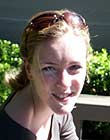 |
March 21, 2003:
 |
"My older brother is in the war right
now. He's in the Marine Corps Reserve, and he went to Kuwait
a couple of weeks ago. It doesn't feel like actual war to
me yet — it's only a couple
of days in and we're winning, not that many casualties.
I've been watching the news a lot, every time there's a
reported casualty like the helicopter crash I worry. They
haven't released the names yet. But there's like 250,000
troops there so chances are it's not
my brother. My mom is trying to act extra-normal, make everyone
in the family feel OK. I don't think the full weight has
gotten to me yet. " —Edwin Shew, second-year
Engineering Undeclared major, at
the Bechtel Engineering Center terrace. Hometown: San
Francisco
|
| "I was supposed to go abroad this summer,
to Amsterdam. Now I'm not sure I will, for safety reasons.
If they don't cancel the program, I'll go, but my friends
are worried about it. Me and my friends discuss the war,
but it's not affecting my everyday life so much. I guess
right now there's nothing happening here in the United States,
but there might be later on." —Candace Williams, third-year
political science major, at Upper Sproul
Plaza. Hometown: Richmond, CA.
|
 |
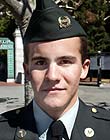 |
"It doesn't affect me personally on a
high level yet. I'm not thinking so much about the political
consequences, but about the troops over there and hoping
they come home safe. Overall most people here have been pretty
supportive and understanding of why [ROTC students] do what
we do — they recognize that everyone has a right to
join if they want." —Severin Perez, second-year
political science major, at Upper Sproul
Plaza. Hometown: Palo Alto, CA.
|
March 19, 2003:
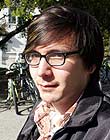 |
"I'm depressed, concerned, worried about
Iraqi deaths. I think the real war is the war on terrorism.
This
war is kind of an adjunct to that. I can only imagine there
will be reprisals — whether against Europe, Israel,
or the United States, I don't know. Is the Bay Area a likely
candidate for terrorism? On a nuts and bolts level, I'm
not so worried. But I do have friends in New York and Washington,
D.C., and I worry about them. We need a total re-thinking
of U.S. foreign policy designed to diminish the likelihood
of terrorism." —David Copenhafer, Ph.D.
candidate in comparative literature, at Dwinelle Plaza
|
| "I'm worried about my personal safety, that
of my classmates, and of the people in Iraq. I already don't
feel safe as a Muslim woman on this campus. After 9/11, we
experienced a lot of hate crimes and it's only going to get
worse. I'm from Ohio, and at home our mosque was severely
vandalized and had to be closed for a year. It's better here — the
Bay Area is a bastion of tolerance, especially Berkeley.
If there's anywhere in the U.S. I should feel safe, it's
here. But I don't. I'm not confident that these problems
are going to be addressed." —Nadia Yousef, fourth-year
student in architecture, at Sproul Plaza
|
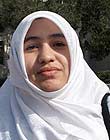 |
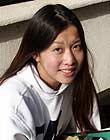 |
"I don't feel the real implications have caught
up with me yet. Personally, I don't feel the war is warranted,
and I'm afraid it will affect the safety of civilians. I'm
not so worried about being here, but the war increases the
risk that anywhere in the United States could become a target." —Patricia Hon, fourth-year
student in integrative biology, at the Tang Center
|
For a list of campus resources, see the War with Iraq site.

